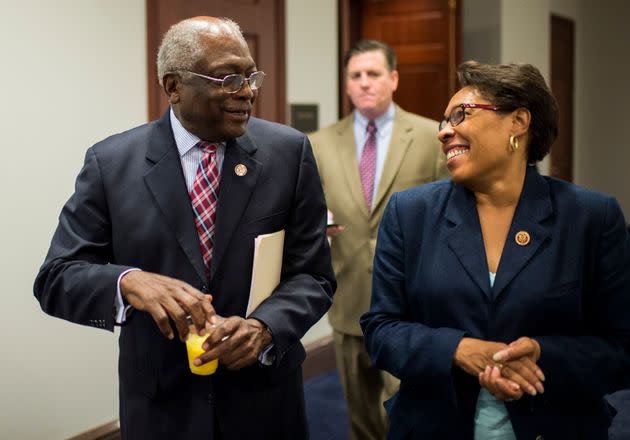The Democratic Establishment Is Going All Out To Beat Nina Turner

Moderate Democratic groups, donors and even some Republicans are flooding Ohio’s 11th Congressional District with millions of dollars in a bid to elect Shontel Brown and defeat progressive favorite Nina Turner in Tuesday’s special primary election.
House Majority Whip Jim Clyburn (D-S.C.), along with Democratic Reps. Joyce Beatty (Ohio), Gregory Meeks (N.Y.) and Bennie Thompson (Miss.), are headlining a get-out-the-vote event for Brown this weekend as well.
Given the Cleveland-area district’s heavy Democratic tilt, the winner of Tuesday’s primary is all but assured to win the special general election in November.
The goal of Brown’s establishment allies, however, is not merely to stop Turner. By defeating Turner, a staunch ally of Sen. Bernie Sanders (I-Vt.) and critic of Democratic Party leaders, these moderates also hope to send a shot across the bow to the nascent activist left ― a signal that they are ramping up efforts to limit the left’s influence in Congress.
“Establishment Dems have largely slept through a lot of primary challenges or a lot of these races where the Justice Democrats have played,” said a moderate Democratic strategist uninvolved in the race, who asked for anonymity for professional reasons. “They’re not going to do that anymore.”
The stakes are high.Sean McElwee, Data for Progress
With polling showing Brown within striking distance of an upset, the activist left is equally desperate to ensure Turner triumphs in the kind of open primary that is normally easier for an insurgent to win. A loss for Turner, a left-wing rockstar with local roots, would be an especially devastating setback for progressives, both because it would represent a missed opportunity for more sway in Congress and because it would deliver a gut punch to movement morale.
To that end, Turner’s allies have erected several super PACs of their own to counter the outside spending arrayed against their candidate and have convened the movement’s biggest stars to stump for her. Rep. Alexandria Ocasio-Cortez (D-N.Y.) addressed pro-Turner canvassers on July 24; Sanders will headline a major get-out-the-vote rally for Turner this coming Saturday.
“The stakes are high,” said Sean McElwee, a co-founder of Data for Progress, a left-leaning consultancy that has conducted polling in a number of close Democratic primaries.
While five left-wing challengers have unseated incumbent House Democrats in the 2018 and 2020 election cycles, progressive candidates have proven less fortunate since President Joe Biden’s election in November. The left’s preferred candidates fell short in the special election in Louisiana’s 2nd Congressional District in April; Virginia’s Democratic gubernatorial primary in early June; and the New York City mayoral primary in late June.
“Each race has its own unique circumstances, but the broader narrative is that under the Biden presidency, progressives need an election message that resonates with our base voters,” he said.

Starting Strong
Given Turner’s sky-high name recognition and early lead, it would be more remarkable if she loses the primary than if Brown falls short.
Turner, a former state senator and Cleveland city councilwoman, got off to a rollicking start in December, locking up progressive support and raising $1 million in her first six weeks on the trail. She leveraged that early cash advantage to get on TV before Brown, a Cuyahoga County councilwoman and local party chair. She used those ads to remind voters of her mainstream Democratic roots, introducing herself as a grandmother and highlighting her work to combat police misconduct alongside then-Ohio Gov. John Kasich (R).
Supplemented by an aggressive ground game and a steady flow of mainstream endorsements ― from state Senate Democratic Leader Kenny Yuko to the Plain Dealer editorial board ― the ad blitz appeared to work. Turner’s campaign publicized an internal poll in early June showing her ahead of Brown by 35 percentage points.
And the threat of outside spending posed by the Democratic Majority for Israel, which endorsed Brown early on and had spent copiously in other primaries, had yet to materialize. (DMFI wanted to get on the air earlier, but did not succeed in raising the funds.)
Turner’s savvy TV campaign and conversion of longstanding relationships into influential endorsements ― Cleveland Mayor Frank Jackson and former Ohio Democratic Party Chair David Pepper were two other key validators ― reflect “the continued professionalization of the left,” according to Alyssa Cass, a Democratic consultant who advised then-candidate Jamaal Bowman during his successful primary run in 2020.
“The inside game is just as important as the outside game,” Cass said.

An Unforced Error
But a mistake in late June exposed a vulnerability that would haunt Turner in the final stretch. Speaking on a panel with rapper “Killer” Mike Render, Turner appeared to express agreement when Render said it was “incredibly stupid” for House Majority Whip Jim Clyburn (D-S.C.) to have endorsed Biden without demanding more in exchange.
Clyburn, the highest-ranking Black member of Congress, endorsed Brown days later and was soon featured in one of her TV ads. He told The State, a local South Carolina newspaper, on Monday that Turner’s participation in the conversation with Render is what pushed him to get involved in the race.
“I was invited by the Turner campaign,” Clyburn said. “(They) talked about my stupidity for endorsing Joe Biden, and I just kind of decided if I’m going to be stupid, might as well be stupid.”
It’s unlikely that Clyburn, a wily operator and committed moderate, needed a provocation to endorse Brown. Brown is a protégé of Housing and Urban Development Secretary Marcia Fudge, whose vacancy she is seeking to fill; Beatty, chairwoman of the Congressional Black Caucus, which shares Clyburn’s cautious politics, got behind Brown in February.
People who vote in the Democratic primary tend to be voters who are proud to be Democrats and prioritize Democratic unity.Alyssa Cass, Democratic strategist
The incident nonetheless underscored the political baggage that Turner had incurred from five years of antagonizing party leaders. Yes, Turner is a former Ohio state senator who made waves with her support for a referendum reforming county government and went on to serve as a top officer in the Ohio Democratic Party.
But as her critics have grown more willing to remind voters, she is also someone who publicly entertained an offer to serve as Green Party presidential nominee Jill Stein’s running mate in 2016, and who, in 2020, likened the choice between President Donald Trump and Biden to deciding between a “bowl of shit” and “half” of that bowl.
A day after Clyburn endorsed Brown, DMFI began its $1.6-million air war, painting Turner as a rogue force who did not embrace Hillary Clinton in 2016 and could not be trusted to partner with Biden.
In Turner’s Cleveland area district, where loyal Black Democrats make up an outsize share of the primary electorate and both Clinton and Biden won landslide primary wins, those attacks were powerful.
A mid-July poll commissioned by DMFI showed Brown narrowing Turner’s lead to five percentage points.
“People who vote in the Democratic primary tend to be voters who are proud to be Democrats and prioritize Democratic unity,” said Cass, a partner at Slingshot Strategies in Manhattan. “If your words can be twisted and painted in a way that makes it look like you are antithetical to that ― which Nina Turner is not, but people she has pissed off perceive that to be the case ― I don’t think Democratic voters like that.”

Fight To The Finish
In the final weeks, the race has devolved into a hand-to-hand slugfest between Turner and her allies on the left, and Brown and hers in the center.
Out of the $2.7 million in outside cash spent in the race as of Tuesday, about $2 million has gone to either supporting Brown or blasting Turner. In addition to DMFI’s massive spend, the corporate-backed Democratic think tank Third Way has invested $250,000 on digital ads opposing Turner.
The influx of outside cash on Brown’s behalf has helped offset the Turner campaign’s fundraising edge, which as of mid-July was $1.8 million.
Together, Brown and DMFI have outspent Turner and her allies on television in June and the first three weeks of July, despite the help Turner has gotten on the airwaves in recent weeks from Democratic Action PAC, a pro-Turner super PAC funded in part by the left-wing group Justice Democrats.
Brown and her allies “have been outspending us in paid communications because they have access to almost unlimited corporate cash,” Turner campaign spokesperson Kara Turrentine said in a statement. “The Big Money interests are apparently terrified of Nina Turner and her people-focused agenda.”
Given the size of Turner’s direct fundraising advantage, however, the gap in TV advertising ― with Brown’s coalition outspending Turner’s by orders of magnitude in some weeks ― may also speak to the Brown team’s superior stewardship of campaign funds. Brown’s top consultant, Daniel Barash of the Washington firm SKD Knickerbocker, previously managed the presidential campaign of Sen. Michael Bennet (D-Colo.). Bennet outlasted then-candidates Kamala Harris and Beto O’Rourke despite far more modest fundraising.
This is a “competitive” of broadcast TV ad buys in the special election in Ohio’s 11th.
You can see Turner being outspent heavily on TV in June even before DMFI gets in.
If Turner falls short, this will be a topic of discussion… pic.twitter.com/Werv6Iw2K2— Daniel Marans (@danielmarans) July 29, 2021
Turner has still managed to turn Brown’s cash surge against her, pointing out that she has received donations from former Cuyahoga County Republican Party Chairman Roger Synenberg and New England Patriots Owner Robert Kraft, a friend of Trump’s who has given to both parties in the past.
In a race where Democratic Party loyalty is a central theme, Turner has used that information to argue that she, not Brown, is a better Democrat.
“Shontel Brown ― it’s hard to tell whose team she’s on,” the narrator intones in a new Turner TV ad that focuses on Brown’s Republican donors.
Brown campaign manager Brian Peters told HuffPost in a statement that there was nothing wrong with the donations.
“Unlike Nina Turner, who has attacked and insulted Democrats like President Biden at every turn, Shontel Brown has built a coalition of Democrats, Independents and yes, even some Republicans, who want to elect someone to Congress who will work with Joe Biden to deliver an economic recovery to Northeast Ohio and stop gun violence,” Peters said.
A number of DMFI’s donors have also contributed large sums to Republican groups and candidates.
DMFI President Mark Mellman defended his decision to accept those contributions.
Democratic campaign committees and candidates are “happy to take Republican money and spend it on behalf of Democrats,” Mellman told HuffPost. “It seems it is only a problem for our critics when we take Republican money and spend it on behalf of Democrats.”
The establishment’s advantages are a lot more formidable when they can harness all of them to focus on what is literally the only race in the country.Rebecca Katz, progressive consultant
Turner has also gone after Brown for declining to recuse herself from county matters that could be perceived as benefiting her partner, whose uncle founded a major construction contractor. Among other things, in 2017, Brown voted to approve a $7-million building contract for the company, whose current executive has also fundraised for her congressional bid.
The conflict of interest has prompted the Ohio state auditor to refer the matter to the state ethics commission for investigation, though it is not clear if the commission will choose to pursue it.
In a new attack ad, Turner misleadingly claimed that Brown is already under investigation and that Brown “could face criminal charges and, if convicted, jail time.”
“Only Nina Turner would run a ‘lock her up’ negative attack ad against another Democrat days before the election,” Brown’s campaign manager Peters said in a statement. “This ad is verifiably false, and is an attempt to deceive voters as Turner’s support collapses.”
Just as Turner has sought to turn the tables on Brown over partisan bona fides though, Brown has tried to undermine Turner’s populist credentials.
The Brown campaign has prompted reporters to ask Turner whether she will disclose the lobbying and consulting clients she has taken on since finishing her work on the 2020 Sanders campaign.
In September, Turner founded Amare Public Affairs, a public relations and public policy consulting firm, under the auspices of Mercury Public Affairs, a massive lobbying and communications shop. Mercury’s federal lobbying clients currently include the health insurance giant Blue Cross/Blue Shield; as recently as last year, the firm represented tobacco giant Altria.
While Turner has vowed to work only with corporations and nonprofits that reflect her progressive values, she did not disclose her clients’ identities when HuffPost asked the campaign this week.
“Nina Turner ran a public relations business that allowed her complete freedom to choose which clients she worked with, clients which included Black-owned businesses and nonprofits,” Turrentine said. “To subject them to vilification from the corporatist world would be very unfair.”

Spinning The Results In Advance
The policy differences between Turner and Brown have sometimes been hard to make out in the highly personal homestretch of the campaign.
But the gap is substantial. While Turner is almost certain to join the “Squad” of young and outspoken progressive lawmakers pushing the House Democratic Caucus leftward on issues ranging from prescription drug regulation to climate action, Brown has made clear that she would walk in lockstep with Democratic Party leaders.
The Cuyahoga County councilwoman has not expressed in detail which policy areas interest her, focusing instead on the easygoing style she plans to employ on Capitol Hill. “I’m going to be a partner to the Biden-Harris administration ― not be a thorn in their side,” she told HuffPost in February.
Even relative to Fudge, Brown would be a modest step to the right, ideologically. Unlike Fudge, Brown does not explicitly support Medicare for All and has declined to say whether she plans to join the Congressional Progressive Caucus. And unlike Turner, she has not ruled out accepting corporate PAC donations.
When it comes to U.S. policy toward Israel ― a source of interest for DMFI and many Jewish voters in Cleveland’s eastern suburbs ― Brown, like Biden, is relatively uninterested in using U.S. power to pressure Israel to change its policies.
Turner, by contrast, supports tying U.S. aid to Israel’s adoption of practices that respect Palestinian human rights, such as an end to the military occupation of Palestinian lands conquered in 1967. During the Israel-Gaza war in May, Turner raised the hackles of more right-leaning pro-Israel groups when she retweeted a left-wing Jewish group that called Israel’s political system “apartheid.”
“The anti-Biden folks and the anti-Israel folks look to her as a leader,” Mellman said. “So she really is a threat to both of our goals.”
The anti-Biden folks and the anti-Israel folks look to her as a leader.Mark Mellman, Democratic Majority for Israel
For all those policy differences, losing the opportunity to have Turner in Congress would be a major defeat for the left.
But progressives are already trying to limit the damage of a potential Turner defeat by downplaying its broader significance.
“The establishment’s advantages are a lot more formidable when they can harness all of them to focus on what is literally the only race in the country,” said Rebecca Katz, a communications consultant who has built her practice on advising left-wing candidates and groups. “In 2022, they won’t have that luxury.”
Some progressives also note that Turner’s struggles have had more to do with her unique history of attacking popular Democrats than with the unpopularity of the left’s agenda.
“If Turner loses, it should certainly engender some deep consideration of the tactical decisions that she made,” McElwee said. “A lot of the tactics that worked when Democrats were out of power are not working anymore. We need to take a beat and ask what it means to be a progressive when Biden is in office.”
In the event that Turner prevails, moderate Democrats likewise foresee a chance for introspection that doesn’t discredit their larger mission.
The establishment is “making a valiant effort here. But they’ve got to recruit better candidates and spend money earlier,” the moderate Democratic operative said. “I don’t think Shontel Brown is a rockstar.”
Regardless of the results of the election, Mellman maintains that DMFI’s impact on the race is significant enough to give Democratic candidates pause before badmouthing a Democratic standard-bearer or embracing a tougher U.S. policy toward the Israeli government.
“If you’re going to be anti-Biden and you’re going to be anti-Israel, it’s going to hurt you,” he said. “There’s no question, whatever the outcome of this race, those positions will have hurt Turner and hurt her a lot.”
This article originally appeared on HuffPost and has been updated.

 Yahoo Finance
Yahoo Finance 